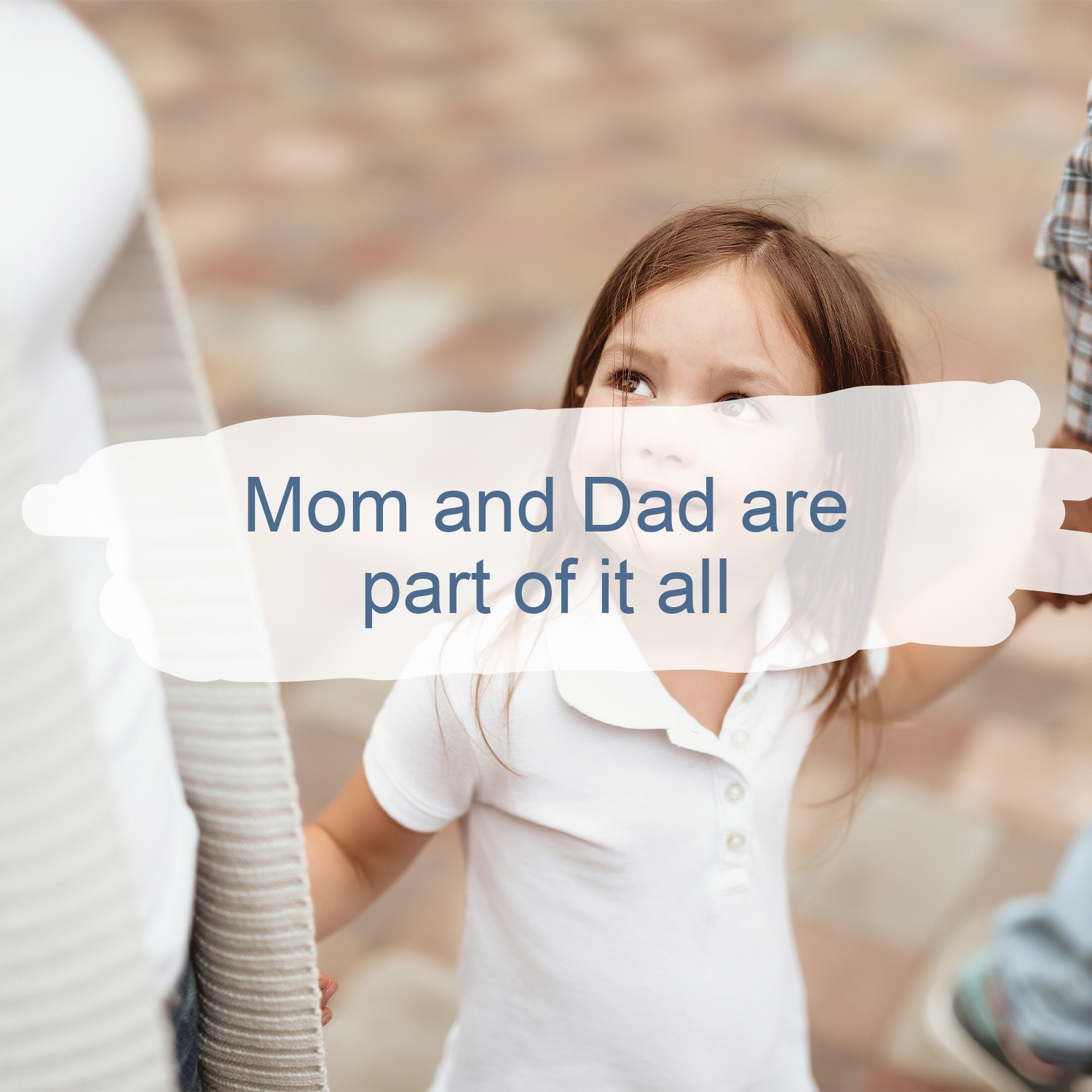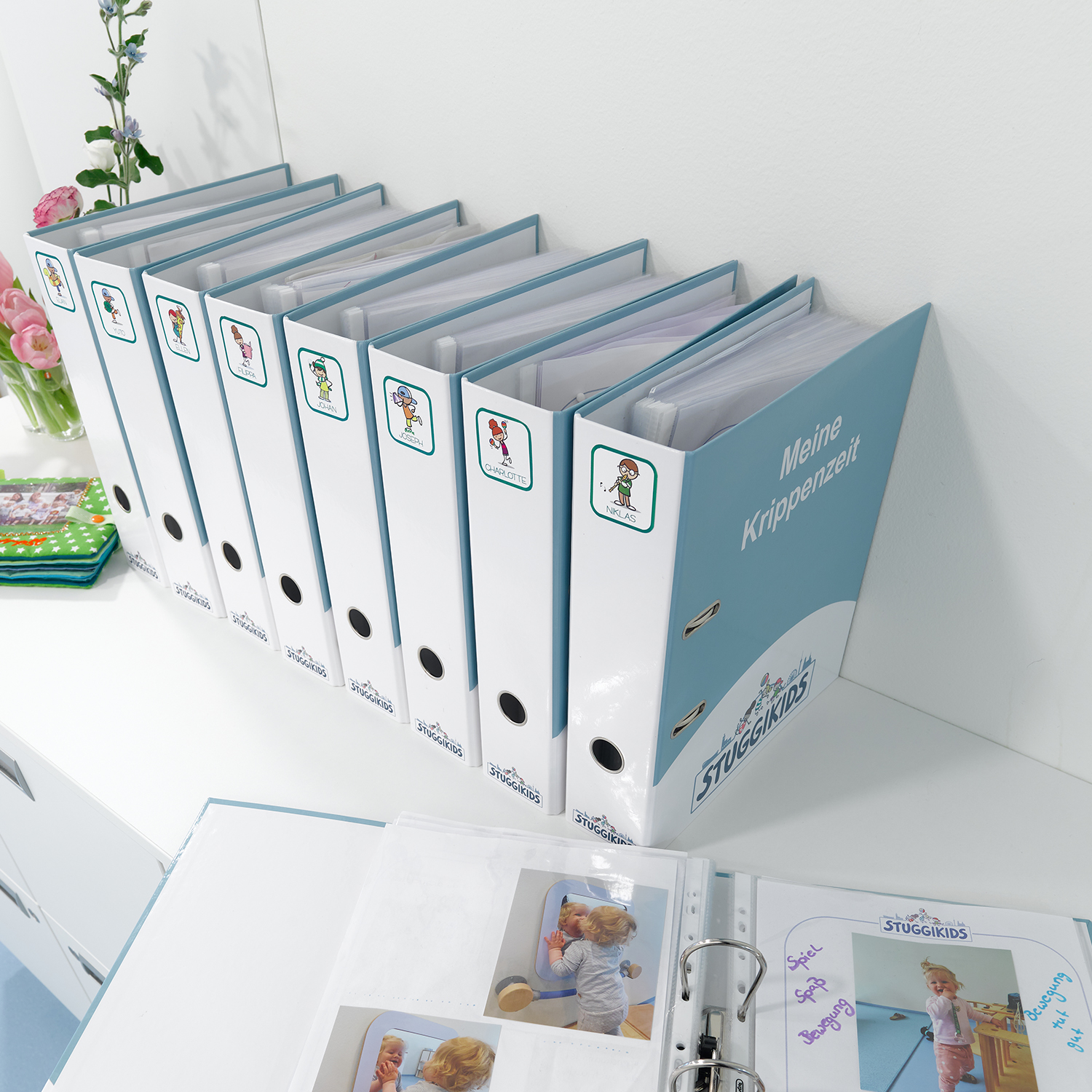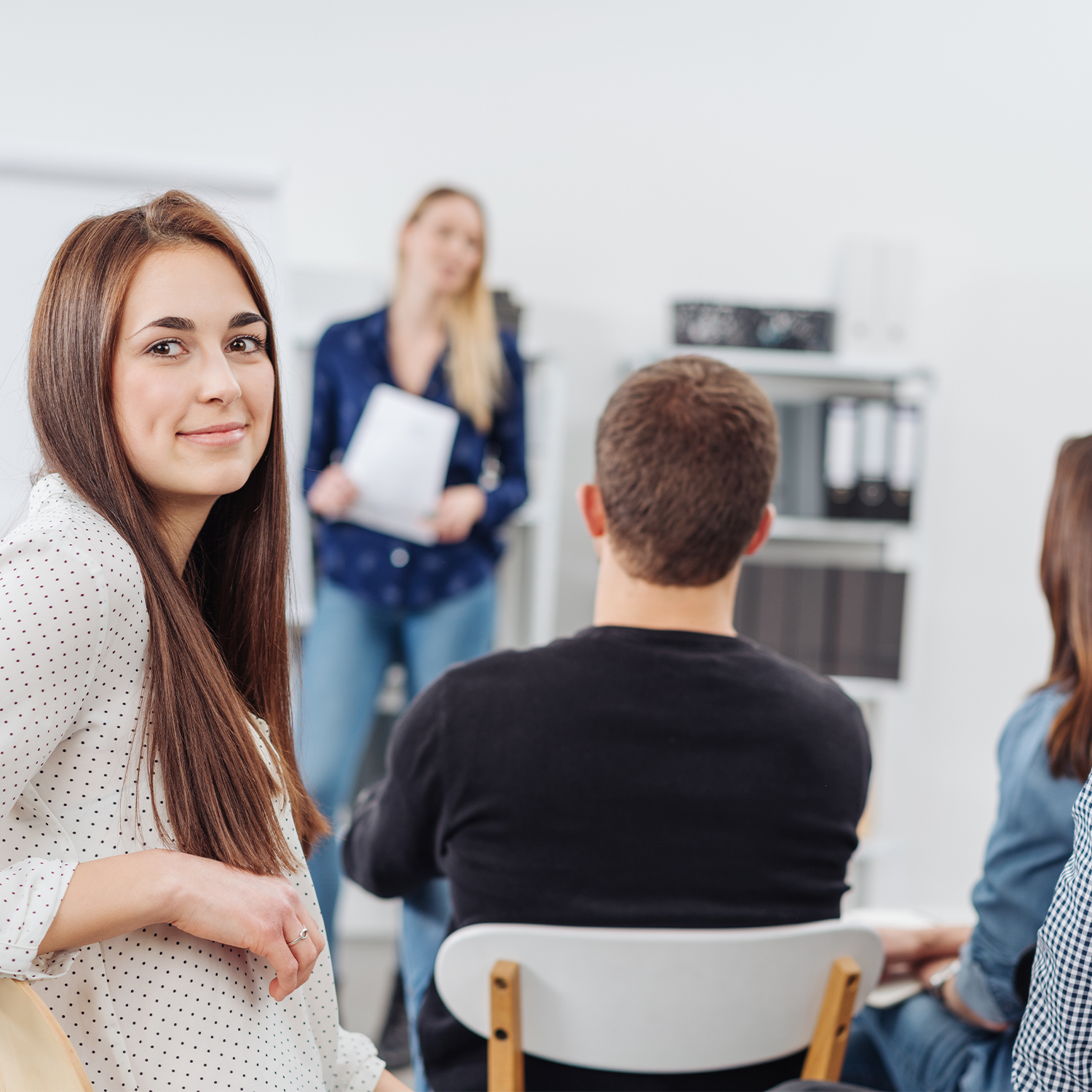
Mom and Dad are part of it all

We see ourselves as active educational and development partners for all children and their families, which is why a trusting cooperation is also the basis of our parental work. You can get a first feeling of our extraordinary and familiar setting during your first visit at STUGGIKIDS.
We will discuss the individual needs of your child and family and plan the settling in together during a detailed „getting-to-know-me“ chat after the admission.
Staff and parents are in constant communication with daily feedback during the handovers. This enables us to talk about important events and experiences.
We’re using an online software called “Kigaroo” which enables us to share important information, such as dates, the weekly meal and activity plans or show an insight into the day-to-day life of the day care centre with uploaded pictures.
In addition, parents can use the “Kigaroo” app to quickly and easily get in touch with other families or the kindergarten and and, for example, let us know that the child won’t come due to sickness, holidays or other reasons.
Parents can learn more about the developmental steps of their child and its everyday experiences in our at least annual summative assessments. If necessary these meetings also offer time to answer any pedagogical questions.
A parents“ evening takes place at the beginning of each new kindergarten year, in which both parents and the entire STUGGIKIDS team can get to know each other and exchange ideas. The parents“ council is also elected for the current year during the parents’ evening.
A summer party, a family christmas party and parents‘ afternoons in the respective groups are also enriching the kindergarten year.

High Level of Quality

At STUGGIKIDS, all teachers follow the same developmental framework. We set quality standards and objectives which are reviewed regularly. Our framework includes a documentation of every child’s abilities and skills on the one hand and a regular documentation of every child’s daily routine and activities in the form of portfolios on the other.
The observation tool we use to reveal the children’s development is inspired by Kuno Beller’s “Development table” and the English „Early years foundation stage“. It allows a comprehensive observation of all developmental areas of the children at STUGGIKIDS. Over the course of a year, every child is observed several times by different teachers in order to obtain as comprehensive a picture as possible of the children’s abilities, interests and needs. Through these observations which we reflect on in the team, we plan activities for each child which we carry out every day in a playful way.
The portfolio we use is a progressive observation method originally developed in New Zealand. When a child joins the STUGGIKIDS, he or she receives a folder. Over time we keep track of all experiences, excursions and activities in words and pictures as a developmental record. This will be a wonderful recollection of the child’s STUGGIKIDS journey and an interesting insight into our daily work and the child’s development for the parents.

„If you stop getting better, you stop being good“ Philip Rosenthal

All teachers at the STUGGIKIDS also contribute to the daily work according to their individual skills and interests.
In our regular employee interviews, we set goals together and give the teachers the opportunity to get an individual further training. This way, our employees are constantly expanding their professional knowledge seeking training in several specialized educational institutions.
In addition, group meetings (kindergarten and crèche each separately) take place weekly, allowing the teachers to exchange knowledge, as well as monthly team meetings, where teachers from both groups take part in an annual conception week. Regular reflections enable us to constantly improve our daily work with the children.
Our high-quality standards also include earning experience through a trainee program at STUGGIKIDS. We offer people with the desire for a pedagogical career either the practice-integrated training (PIA) at our institution, as well as the completion of a probationary year or work as partners in the cooperative (dual) study program. We also appreciate giving young, committed people their first insights into a professional social field during the so called Voluntary Social Year (FSJ).
We are always willing to support, accompany and supervise people with international degrees in order to have their studies validated by the German authorities as a pedagogical specialist. As a result, we have observed a great enrichment in our team.

Settling in

The transition from home to day care centre is a new and exciting stage of every child´s live.
Based on the Berlin settle in model, where the gradual settle in happens considering the individual pace of each child, we aim to create a solid basis for a trustful bond, between the teachers and the children..
In order to cope with this important process as easy as possible, the child is accompanied and supported by a key teacher who takes the role of a safe haven in the kindergarten during the settling in. Together with that, the family gets a first insight into the quotidian of the day-care centre (daily routine, rituals, play materials, rooms, etc.). The main feature of the settling in process is the development of a lasting and trusting relationship between the teacher and the child.
The settling in at the STUGGIKIDS is divided into 5 phases:
First, we have an introductory meeting between the teacher and the parent/reference person, where all information about the settling in and the daily routine at the day-care centre is shared and questions are clarified.
In the beginning phase, also called bonding phase, the first cautious steps are taken between the teacher and the child, while the parent/reference person is attentive but takes a passive role in the group room – the getting to know phase.
The first short separation attempt usually takes place on the 4th day of settling in. Depending on the child’s reaction to the separation phase, which is between 15 and 30 minutes, always considering to the child’s needs. If the child cannot yet be comforted by the teacher, the parent/reference person is brought back and the beginning phase is extended, giving teacher and child a longer time to bond.
Once a bond between teacher and child is established, the fourth phase, the stabilization phase, begins. The separation time is then extended daily, so that the child gets used to the daily routine of the day care centre in its own pace.
In the final stage of the settling in, the parent/reference person is at a reachable distance, but no longer in the facility. The settling phase is then over when the child trusts the teacher and allows itself to be comforted by this person during transitions from one activity to another and everyday situations.
If the child cries or gets upset when being brought to the crèche/kindergarten, but the behavior upon the key teacher is decisive. If the child allows itself to be comforted by the key teacher and gets distracted with other activities in the group, the settling in is then considered complete.

About our facilities and equipment

Digital Media and Media Literacy Education
The question of whether digital media should play a role in kindergarten is being highly and often emotionally discussed. We do not advocate children to use digital media on a daily basis. For us, digital media should rather be complementary.
We use digital media in various ways in our projects as part of our pedagogy, enabling the children to explore and use them in a creative way.
In addition to tablets, laptops, music boxes and cameras, the interactive projector is a particularly fascinating tool to the children. Whether used in the preschool program or for a virtual wall painting, it offers plenty of exciting opportunities for every child. The children enjoy watching our self-made videos e.g. of our Christmas performances in an exciting cinema atmosphere.
Safety measures for the children and the team
Our day care centre is not only barrier-free but we also have equipment which meets the latest technical standards. In addition, our construction teams avoided sharp corners and edges wherever possible.
Fire protection plays a prominent role in any educational institution. Our facility is equipped with an in-house fire warning system which we obviously hope will never be needed and the escape route signs are especially designed to be easily recognizable for young children.
Fire extinguishers are placed in a height easily accessible for adults, but yet not reachable by children.
In order to make sure only authorised persons have access to the building, we are equipped with a video surveillance system. When the doorbell is rung, our team members can visualise the image on their smart phones or tablets. In addition, we have CCTV in central areas of our facility.
We are very pleased that our day-care centre is barrier-free and suitable for wheelchairs. Our building was designed in a way in which corridors enable easy passage for wheelchairs. We also have an internal lift, which not only makes our daily work easier, but also enables STUGGIKIDS to welcome children with disabilities.
Another measure for accident prevention is that all exterior and interior doors have anti-pinch protection. This significantly reduces the risk of injuries.
Noise protection
The daily noise in a day-care centre – especially high pitch frequencies – can quickly become a strain on everybody. We want to make sure that both teachers and children are protected as much as possible from loud noises. To do so, our building is equipped with high-quality sound insulation on walls and ceilings and the tables in the dining room have sound absorbing surfaces.
Light
Our day-care centre offers extra bright and welcoming rooms. We all know how essential sun light is for our well-being and mental health. Our floor-to-ceiling windows and vision panels in our interior doors let the sunshine in and contribute to our children’s and team members’ happiness. Let the sunshine in….!
Ergonomics
All our furniture’s designs are customised. Ergonomic and height-adjustable chairs are particularly important to us. Every STUGGIKID in the kindergarten can adjust his or her chair individually. In the crèche, these chairs can be equipped with backrest and belts in addition, so that everyone can be seated comfortably.
Our tables can also be adapted to the corresponding chair heights, therefore, ensuring comfortable sitting. However, our chairs are not only a means for seating as they can also be used as building blocks in the physical activity-room such as a marble run, landscape for movement or as a theatre setting. A fun factor!
Another important aspect: our high-quality wooden furniture is not only easy to clean and maintain, but also so light and stackable that the STUGGIKIDS can easily lift them themselves. The tables are designed to slide underneath or above one another. Rapidly, a room full of chairs and tables can be turned into an open space for playing and dancing – with the help of the children.
In the crèche area, we put a lot of thought into the sleeping arrangements. We opted for see-through bunk beds which allow the toddlers to meet the teachers as equals and older children can get in and out autonomously. As the beds are at a certain level from the floor, our team members don’t need to bend down and therefore can rest their backs. We all love these ingenious bunk beds!
With our electric buses, equipped with sun and rain roofs, we can travel comfortably up and down the numerous hills of Stuttgart with a group of six children.
An extensive number of practical features, such as adjustable ergonomic seats, height-adjustable headrests, and handlebars as well as special baby seats bring flexibility, safety and fun during all our outdoor activities.
The low entry step of our bus which is covered with non-slip tread mats provides safe access and helps our supervisors to keep an eye on everyone. Thanks to our bus with open or closed roofs, we can reach almost every corner with all our toddlers and small children on board.
Hygiene
Ever since during the construction phase, we value and prioritize the importance of the above-average hygienic equipment, which is of course gives us benefit now. The ventilation and air-circulation system as well as supplementary air cleaners filter the harmful substances and viruses in the air.
Touch-free disinfectant, soap and paper towel dispensers are popular and liked by the children and also ensure the lowest possible transmission of bacteria, viruses and fungi.
Our floor which is designed with the natural rubber flooring makes it hygienic and easy to be cleaned. We are also concerned in using the washable furnishing items. In addition, we only use natural fiber rugs to sit on to make the morning circle or playing comfortable.
Other equipment
We also make sure that our toys and craft materials are made of nontoxic substances. Thus, we increasingly rely on smaller manufacturers that produce high quality materials according to our specific items request.
It is also essential to us to sensitise the STUGGIKIDS to our environment and to strengthen their awareness of our ecosystem. We do our best to promote the sustainability, for example by using child-friendly cloth napkins or doing waste separation even in the group room.

Cooperation

Doing the regular visits to the residential care home for elderly enable the STUGGIKIDS to get in touch with the elderly people by playing, singing and doing intergenerational learning together. Even though during the corona pandemic, we keep up this cooperation and regularly bring small pictures and handicrafts made by the children to put a smile on elderly people’s faces, especially in difficult times.
In cooperation with the Wohlfahrtswerk as well as the International Bund, our team is supported by young adults doing a so called freiwilligen sozialen Jahres or social year voluntary, which makes the children’s day-to-day life even more colourful.
We STUGGIKIDS are also participating in the kindergarten of the Bewegungspass from the respective institution, Amt für Sport und Bewegung. This enables a practical concept for fostering the targeted playful children’s movement activities.
(refer to www.bewegungspass-bw.de)
As a member of the Verband freier unabhängiger Kindertagesstätten Stuttgart, our interests are also represented by this association. Here we have many years of know-how at our disposal, which we are happy to draw on.
(refer to www.vfuks.de)
